Some years ago, filmmaker Daniel Karslake, director of the acclaimed documentary, For The Bible Tells Me So, learned that every three seconds someone around the world—usually a child—dies because of the effects of living in extreme poverty, often from hunger, malnutrition, or disease. When he did the math, he realized that meant about 300,000 people die due to poverty every ten days—as many as had died in the 2004 South Asian tsunami. Yet, unlike the tsunami deaths, deaths from poverty were largely preventable.
At first, Karslake didn’t believe it; but he soon found out that the estimates of death were generally accurate. This knowledge motivated him to want to do something to call attention to the problem. He decided to make a film to inspire people to action, instead of turning them off or making them feel hopeless. And he knew talking about statistics just wouldn’t do the trick.
The result is his newest film, Every Three Seconds, which chronicles the amazing stories of five everyday heroes involved in the anti-poverty movement:
- Seventy-one-year-old Gloria Henderson, who champions “gleaning”—collecting unused food from farms to give to the hungry—in Jacksonville, North Carolina;
- Lisa Shannon, who is raising money and lobbying Congress to combat the brutalization of women in the Congo;
- Seven-year-old Charlie Simpson of London, who organizes bike-riding fundraisers and has raised over 250,000 pounds for earthquake relief in Haiti;
- Ingrid Munroe, who gives micro-loans to poor people in Kenya to pull themselves out of poverty; and
- Josh Nesbit, who recycles used cell phones and provides them to healthcare workers in Malawi.
Their stories are remarkable, not only for showing how much one person can do to make a difference, but for demonstrating the natural human instinct for compassion.
Karslake’s film will be part of Greater Good’s first MOOC, “The Science of Happiness,” which started on September 9th. The film will be formally released on October 16th on World Hunger Day, and the singer Katy Perry, among other supporters, will be helping to raise awareness about the film.
I interviewed Karslake by telephone at his house in Berlin.
Jill Suttie: The people who are featured in your film seem like ordinary people who became motivated to take extraordinary compassionate action. What attracted you to their particular stories?
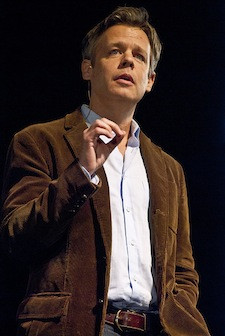 Daniel Karslake
© TEDxOrlando Team
Daniel Karslake
© TEDxOrlando Team
Daniel Karslake: They all started small. None of them went into what they were doing with this idea that they were going to have a huge impact and be world-changers. None of them had grand plans. All of them decided to do one thing so that they could feel like they were helping. They all started small, very humbly, and followed wherever the next step led. Ingrid started giving out small loans to people she knew; Josh just wanted to help one hospital to get cell phones so they could reach more people easily. They didn’t know that their efforts would result in a major micro-financing project in Kenya or an international organization to provide technical support for health providers.
Of course, there are also plenty of cases of people who started out doing small, great things that got bigger and bigger, but at a certain point they thought, “I have my job, I have my family, this can’t become my life.” That’s healthy, too. If everyone would engage to whatever extent that they could in an issue like hunger and extreme poverty, which is so solvable now, this would be a different world. It would actually be a world that works for everyone.
JS: What do you think motivates people to help with large-scale problems like hunger rather than just tuning it out?
DK: I think we’re socialized to feel completely overwhelmed by the issue of hunger. I grew up seeing all of these images on television of really poor children—emaciated, malnourished, covered in flies, sitting in mud, crying—in commercials for charities trying to raise money to help them. And, as a child, these images had a certain effect on me. I was one of those kids who would run around the block raising money for local telethons. But later those images became just another child way over there that isn’t really me. It became easier to tune it out.
What it takes for people to engage is a realization that taking action isn’t about our responsibility to do something; it’s not even really about our moral duty to help people who are hungry. It’s about having an opportunity right there in front of you and then seizing it instead of letting it go by. When you look at someone like Josh or Charlie or Ingrid or Gloria or Lisa, what happened with them is that they experienced a moment when they saw that they could have an effect on somebody—not on the world, not on a country, but maybe on an individual or a family—and they took that opportunity.
JS: People in your film talk about the joy their work brings them. Do you think the search for happiness plays a role in compassionate action?
DK: There’s a myth that giving is all about the beneficiary, when in fact people feel really good when they give. There’s a reason why being altruistic feels so good: your body is primed to react. Giving a microloan to someone who needs it, for example, isn’t only good for the people you’re giving to; it’s really good for your own immune system—it’s good for your breathing, for your heart. I’ve talked to a lot of people about the part in the film where we discuss the research on what altruism does physically to people, and almost to a person they say something like, “That makes a lot of sense, but have they actually done experiments? Is this really science?” And I say, “Yes, it’s really science. Check it out! It’s amazing!”
The people featured in our film were motivated to take action by their compassion instinct or empathetic nature, and then they found that their lives changed in such positive ways. I’m sure they wouldn’t say, “I feel my vagus nerve working;” but it’s definitely part of what keeps them going.
JS: Through Charlie’s story, you touch on how children are born with altruistic impulses. What nurtures altruism in kids?
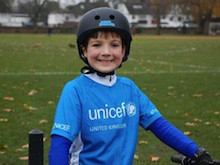 Charlie Simpson, who is featured in Every Three Seconds.
© The Independent
Charlie Simpson, who is featured in Every Three Seconds.
© The Independent
DK: When I was a visiting scholar at Stanford researching the film, I heard a lecture by Michael Tomasello [of the Max Plank Institute in Germany] about research on altruism in infants. He played videos for us of experiments where there would be an infant in a room, and someone would come into the room and drop their keys and say “Oops. I dropped my keys!” and the babies would all crawl over, pick up the keys, and hand them up to the person who dropped them…up until the babies were about 14 months old, that is. After that age the babies would start holding onto the keys saying “Mine.” Tomasello’s point, which had such an impact on me, is that we are wired first to be altruistic. Where we go after that is learned.
I feel that Charlie’s story is as much a story about his desire to help children in Haiti as it is a story about great parenting. Charlie had a very strong response to what he saw on TV. He was devastated, and he told his mother he wanted to do something to help. Because his father had modeled engagement before—by riding his bike from London to Paris to raise money for cancer research—Charlie had that example in mind. The other pivotal thing was that his mom didn’t try to placate Charlie and say, “Oh, it’s going to be OK. Let’s give five pounds to UNICEF, and then you can go out and play.” Instead, she challenged him and said, “Ok. If you really feel strongly about this, what can you do to help them?”
The effect of Charlie’s parents on this can’t be understated. His parents not only encouraged him to engage, they were examples of how to do it, and were with him the whole way.
JS: When Lisa says in the film, “I’ve come to realize that there is no greater threat to human security on this planet than our well-trained capacity to flip off our empathy switch,” it’s a very poignant moment. What prevents us from switching off our empathy?
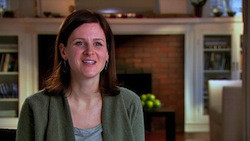 Lisa Shannon in Every Three Seconds.
Lisa Shannon in Every Three Seconds.
DK: I live in the center of a country [Germany] where the entire country flipped off its empathy switch in 1933, and look what happened. Is there something to prevent that? Yes, absolutely. Engage. One word. You cannot engage in any of these challenges and not have your empathy and your compassion right there in the front of your mind.
Disengagement and cynicism are things to avoid at all cost. If we are going to indulge in and give way to cynicism, then I think we’re pretty much done, because nothing is going to break through, nothing feels important anymore. But engagement is the great emancipator. I really feel strongly that to engage is to shatter all of those negative belief systems that we have.
JS: We sometimes hear in the news about misguided attempts to give to the poor or about aid intended for one group ending up with the wrong people. How can we give aid and be sure we are helping instead of making a problem worse?
DK: I get this question a lot. What I say to people is, “Educate yourself.” Read about the various types of aid that exist and find out how they’ve worked over the years. There’s a lot of documentation about how various sources of aid given in different countries in different ways have worked and how they haven’t.
One of the biggest reasons traditional aid can turn toxic is that people in resource-rich countries sometimes try to decide what is best for a community in a resource-poor country and end up pursuing a solution without any actual contact with the people on the ground who are living the reality. That has been a hallmark of Western aid in the last 40 years, and really only in the last 10 years or so have aid organizations started to get the idea that people already know what they need in their communities. Yes, they aren’t really going to say “no” to money being dumped on them. But more and more communities are clear that they need more than a one time grant of food or money; they need sustainable growth. That’s why micro-finance, when it’s done well, like what Ingrid does, is such a miracle. Hundreds of millions of people have climbed their way out of poverty through micro-finance programs like hers.
For people who are in need of immediate aid—like those in Haiti, after the earthquake—that’s a different story. Then it’s a matter of researching the organization online. There are many websites that will tell you how aid organizations spend the money they are given, and you can make your informed decision that way.
JS: How has this film changed your own life?
DK: I was deeply changed by my first trip to Malawi. Malawi is an extremely poor country, and I went to the poorest parts of Malawi for the story about Josh. The experience I had there really stunned me. Before I went, I was nervous, because I thought, “I am way too empathetic, and this is going to devastate me. I’m going to come home and just have a depressed life.”
And I had the exact opposite response. I came home completely euphoric, because I realized that people who live day-to-day getting enough food and water for their family will reach a point where, after they’ve secured what they need, they’ll stop striving. And then they’ll sing and dance or they’ll worship or do whatever gives them joy. They have this experience of life that is completely different than mine, because they pay attention to what they have… not what they don’t have.
Before I went to Malawi, I’d been totally conditioned to pay attention to only what I didn’t have. I had a car, but I wanted that car; I had 15 shirts, but I wanted that one. I’d been completely conditioned, and therefore I was hungry in a completely different way. In resource-poor countries people don’t have enough food or medical care; in the West, people are always striving for bigger, better, faster, more—there’s no definition of enough. It’s two kinds of hunger.
I’m really jealous of the people I met in Malawi. There was a contentment, a centeredness I’d never seen before in a human being. I’m not a particularly religious person; but when I was in Malawi, I remember having this lightening bolt moment when I thought, “This is what Jesus meant when he said the poor shall inherit the earth.”
It shifted me in a big way, and I’m really grateful for that.



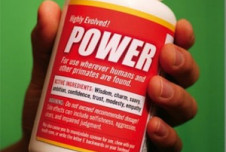
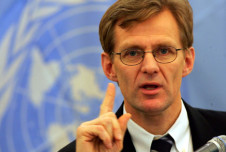
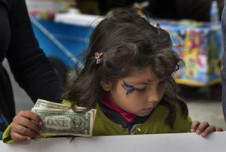
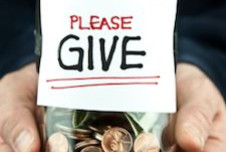

Comments